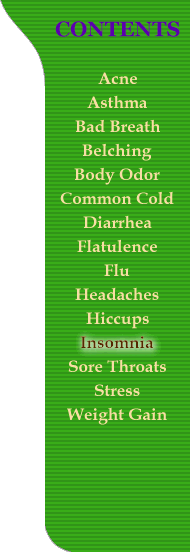| You
know the story: It's 5:00 a.m. and the first traces of dawn have begun
to appear in the nighttime sky. You've been awake since 2:00 a.m. and are
beginning to feel hopeless about ever getting back to sleep. How will you
function at work tomorrow or is it today? How will you keep yourself from
yawning through the lecture? How will you make it through another day after
yet another night without sleep?
Insomnia is the most common sleep disorder in the world. A whopping number of people cannot sleep well enough to function well during the day. One-half of these people have only one or two bad nights a week. The other half spend countless sleepless nights tossing and turning, staring at the alarm clock, and feeling miserable. They also spend countless days exhausted. Fortunately, after many years of study, sleep experts have come up with many tried-and-true strategies for putting an end to insomnia. The results of their work appear in the tips that follow. Try them out, and see what workd for you. If nothing has helped after six months - if you're still struggling to get a decent night's sleep - consult your doctor. Make it as nonpunishing as possible. The worst thing that an insomniac can do is to lie in bed tossing and turning. Pass your time reading in bed or watching television, rather than lying in bed frustrated. This goes for everyone. If you are lying in bed, even if you are not sleeping, your body will still get the same amout of recovery as if you had slept. Although your brain doesn't get any recovery, you'll still be better off than if you sped the time watching the clock, tossing and turning. Hide the clock; put it out of view. You'll only watch it getting later and later and get more and more tense. Don't nap. Napping tands to make matter worse for the chronic insomniac. The concept is similar to the reason you shouldn't stay in bed late the morning after you had trouble sleeping: you'll have more trouble getting to sleep the next night, thereby compounding your insomnia. Its' best to let yourself get good and sleepy so that it will be easier to get to sleep the next night. Change you interpretation of the problem. Several misconceptions about sleep can make people overly concerned about their insomnia and can actually keep them awake. One example is when people wake up out of what seems like a deep sleep and feel wide awake. They think that because they feel so alert that they will never be able to get back to sleep. However, this is not the case. What happens is that if insomnia wakes you from your REM stage [REM stands for Rapid Eye Movements, the stage of sleep in which you dream], you will be very alert. However, all you have to di is wait for 30 minutes and you will easily fall back to sleep. The key is to understand that your awakening is natural and that you just have to wait it out. Another instance of mistaken perception is that when prople wake, they often have the feeling that they were never asleep at all. But most people sleep much longer than they think. Try earplugs. Sometimes, insomnia is caused by being awakened
repeatedly by loud noises. Often, the sleeper is not aware of what awakened
him or her. The classic case is a person who lives near a airport. A doctor
suggest minimizing ambient noise as much as possible and failing that investing
in a good pair of earplugs.
|
 |
|
|
How Much Sleep
Do You Need? The word
of the day is that adults need eight hours
of sleep per night. But is that
the case for everyone?
|
||